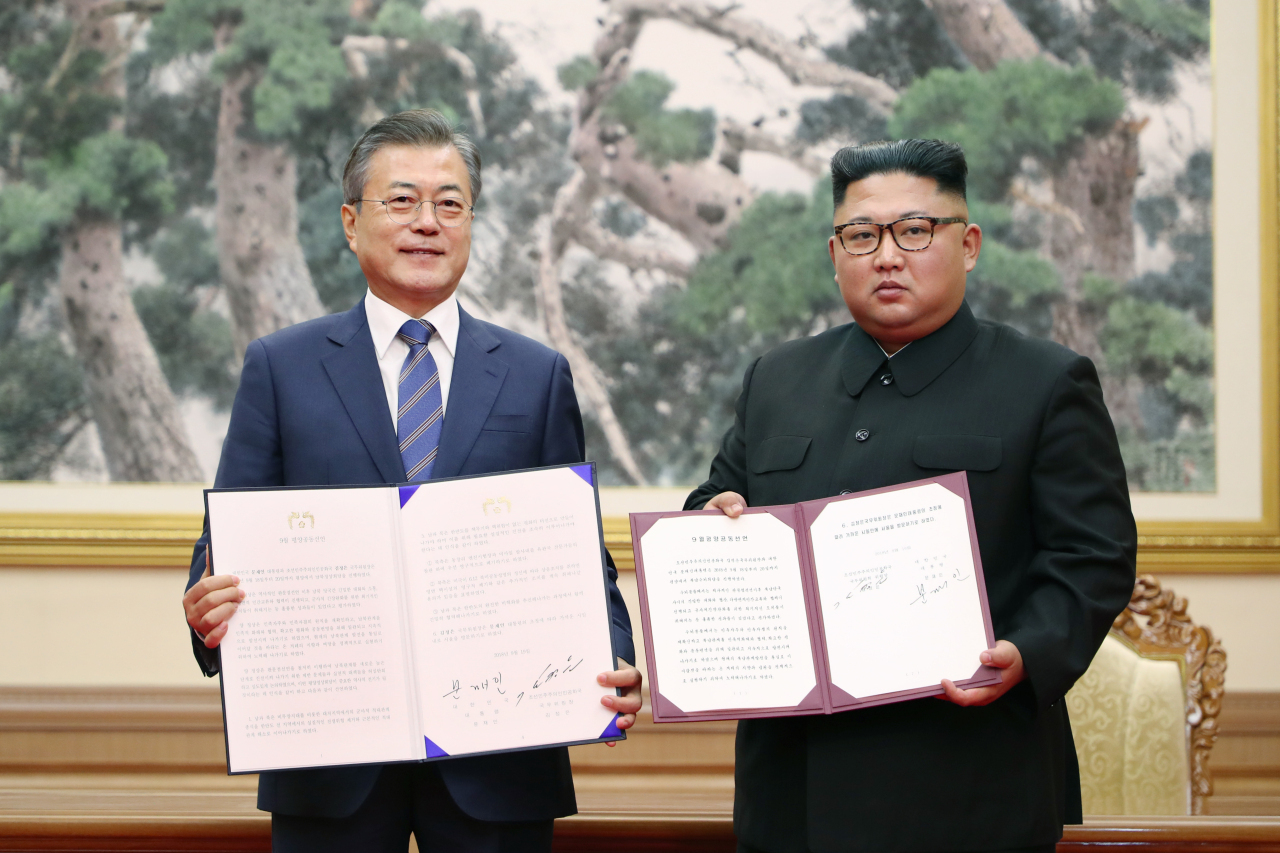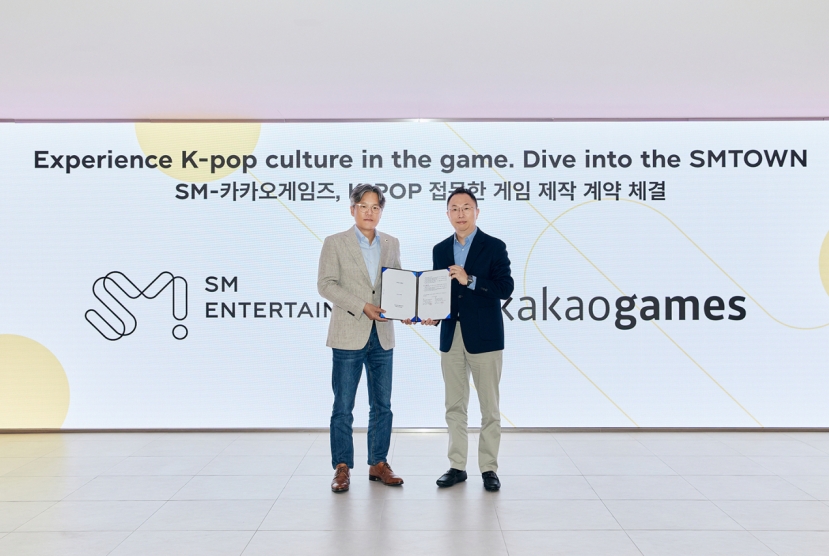Critics dismiss ruling party’s olive branch to North Korea
Party wants people to look back on Moon’s legacy and associate it with inter-Korean detente to come, critics say
By Choi Si-youngPublished : July 7, 2021 - 13:53

The ruling Democratic Party of Korea is desperately seeking to carry on President Moon Jae-in’s legacy and revitalize inter-Korean ties, but with North Korea still unwilling to engage, its last-minute attempt at diplomacy stands little chance, critics say.
Recently, the party has said it will seek parliamentary approval of the 2018 Panmunjom Declaration -- the first of Moon’s two peace deals with North Korean leader Kim Jong-un -- to rekindle talks. At the 2018 summits, Moon and Kim agreed to end inter-Korean hostilities and work for Pyongyang’s denuclearization.
But Pyongyang, which demolished an inter-Korean liaison office in June 2020 to protest Seoul’s handling of anti-North Korea activists, has demanded sanctions relief for nuclear talks to resume. The North has rebuffed entreaties from the South and the US for diplomacy since President Joe Biden took office in January.
“There’s no sign North Korea is now amenable to change and the party, which is well aware of that, is pushing for the last-minute engagement to serve its own interests,” said Shin Beom-chul, director of the Center for Diplomacy and Security at the Korea Research Institute for National Strategy.
The latest efforts have more to do with making Moon’s legacy from 2018 stick than seeking a real breakthrough, according to Shin. The parliamentary approval would be Moon’s footprint that people would later associate with progress in inter-Korean relations, Shin added.
“Moon was the one who met with Kim and shook hands on denuclearization. The message is simple enough to resonate with the larger public,” Shin said, noting the party should seek parliamentary approval of all key inter-Korean declarations if it is really serious about building peace on the Korean Peninsula.
Shin Jong-woo, a senior analyst at the Korea Defense and Security Forum, said the ruling party knows it needs the approval to bring closure to Moon’s rocky engagement with Kim Jong-un. Their historic meetings that spoke for peace in 2018 did not pan out as the two leaders said they would.
“North Korea launched missiles. That pretty much sums up what had followed the rare Moon-Kim handshakes, but that’s not the picture Moon’s party wants the public to remember. So it’s bookending the gatherings in its own way to show something actually good has come out of the brief engagement,” Shin said.
Choi Kang, acting president of the Asan Institute for Policy Studies in Seoul, pointed out that it would be an “unfair burden” on Moon’s successor if the parliament made the 2018 declaration binding, since it involves many inter-Korean projects potentially worth billions of dollars.
“Leave all that to the next government to figure out. We should not be held hostage by the government leaving soon,” he said.
Meanwhile, experts dismissed the party chief’s suggestion that Seoul should help Pyongyang build small modular reactors, or SMRs, which cost less and are easier to manufacture and maintain than large conventional reactors. UN sanctions prevent any transfer of such technologies, they said.
Earlier, Democratic Party Chairman Rep. Song Young-gil floated the idea, with experts flagging a previous broken deal between Washington and Pyongyang in 1994, known as an agreed framework. At the time, the US offered fuel oil and light-water nuclear reactors in exchange for the North’s eventual denuclearization.
While North Korea is better suited than the South for SMRs because Pyongyang would not need as much electricity as Seoul, building them there would not be feasible unless sanctions relief or denuclearization were to take place, said Chung Bum-jin, a professor of nuclear engineering at Kyung Hee University.
Choi of the Asan Institute said North Korea would show little interest in SMRs anyway, because it is looking to improve its nuclear weapons and not the power grid.
“After all, what can you do, really, if you’re looking at a partner unimpressed by anything you’re doing?” Choi said.
Recently, the party has said it will seek parliamentary approval of the 2018 Panmunjom Declaration -- the first of Moon’s two peace deals with North Korean leader Kim Jong-un -- to rekindle talks. At the 2018 summits, Moon and Kim agreed to end inter-Korean hostilities and work for Pyongyang’s denuclearization.
But Pyongyang, which demolished an inter-Korean liaison office in June 2020 to protest Seoul’s handling of anti-North Korea activists, has demanded sanctions relief for nuclear talks to resume. The North has rebuffed entreaties from the South and the US for diplomacy since President Joe Biden took office in January.
“There’s no sign North Korea is now amenable to change and the party, which is well aware of that, is pushing for the last-minute engagement to serve its own interests,” said Shin Beom-chul, director of the Center for Diplomacy and Security at the Korea Research Institute for National Strategy.
The latest efforts have more to do with making Moon’s legacy from 2018 stick than seeking a real breakthrough, according to Shin. The parliamentary approval would be Moon’s footprint that people would later associate with progress in inter-Korean relations, Shin added.
“Moon was the one who met with Kim and shook hands on denuclearization. The message is simple enough to resonate with the larger public,” Shin said, noting the party should seek parliamentary approval of all key inter-Korean declarations if it is really serious about building peace on the Korean Peninsula.
Shin Jong-woo, a senior analyst at the Korea Defense and Security Forum, said the ruling party knows it needs the approval to bring closure to Moon’s rocky engagement with Kim Jong-un. Their historic meetings that spoke for peace in 2018 did not pan out as the two leaders said they would.
“North Korea launched missiles. That pretty much sums up what had followed the rare Moon-Kim handshakes, but that’s not the picture Moon’s party wants the public to remember. So it’s bookending the gatherings in its own way to show something actually good has come out of the brief engagement,” Shin said.
Choi Kang, acting president of the Asan Institute for Policy Studies in Seoul, pointed out that it would be an “unfair burden” on Moon’s successor if the parliament made the 2018 declaration binding, since it involves many inter-Korean projects potentially worth billions of dollars.
“Leave all that to the next government to figure out. We should not be held hostage by the government leaving soon,” he said.
Meanwhile, experts dismissed the party chief’s suggestion that Seoul should help Pyongyang build small modular reactors, or SMRs, which cost less and are easier to manufacture and maintain than large conventional reactors. UN sanctions prevent any transfer of such technologies, they said.
Earlier, Democratic Party Chairman Rep. Song Young-gil floated the idea, with experts flagging a previous broken deal between Washington and Pyongyang in 1994, known as an agreed framework. At the time, the US offered fuel oil and light-water nuclear reactors in exchange for the North’s eventual denuclearization.
While North Korea is better suited than the South for SMRs because Pyongyang would not need as much electricity as Seoul, building them there would not be feasible unless sanctions relief or denuclearization were to take place, said Chung Bum-jin, a professor of nuclear engineering at Kyung Hee University.
Choi of the Asan Institute said North Korea would show little interest in SMRs anyway, because it is looking to improve its nuclear weapons and not the power grid.
“After all, what can you do, really, if you’re looking at a partner unimpressed by anything you’re doing?” Choi said.
-
Articles by Choi Si-young







![[KH Explains] How should Korea adjust its trade defenses against Chinese EVs?](http://res.heraldm.com/phpwas/restmb_idxmake.php?idx=644&simg=/content/image/2024/04/15/20240415050562_0.jpg&u=20240415144419)











